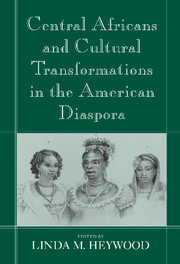Book contents
- Frontmatter
- Contents
- List of Contributors
- Foreword
- Acknowledgments
- Introduction
- PART ONE CENTRAL AFRICA: SOCIETY, CULTURE, AND THE SLAVE TRADE
- PART TWO CENTRAL AFRICANS IN BRAZIL
- PART THREE CENTRAL AFRICANS IN HAITI AND SPANISH AMERICA
- 7 Twins, Simbi Spirits, and Lwas in Kongo and Haiti
- 8 The Central African Presence in Spanish Maroon Communities
- 9 Central African Popular Christianity and the Making of Haitian Vodou Religion
- 10 Kongolese Catholic Influences on Haitian Popular Catholicism: A Sociohistorical Exploration
- PART FOUR CENTRAL AFRICANS IN NORTH AMERICA AND THE CARIBBEAN
- Index
10 - Kongolese Catholic Influences on Haitian Popular Catholicism: A Sociohistorical Exploration
Published online by Cambridge University Press: 28 October 2009
- Frontmatter
- Contents
- List of Contributors
- Foreword
- Acknowledgments
- Introduction
- PART ONE CENTRAL AFRICA: SOCIETY, CULTURE, AND THE SLAVE TRADE
- PART TWO CENTRAL AFRICANS IN BRAZIL
- PART THREE CENTRAL AFRICANS IN HAITI AND SPANISH AMERICA
- 7 Twins, Simbi Spirits, and Lwas in Kongo and Haiti
- 8 The Central African Presence in Spanish Maroon Communities
- 9 Central African Popular Christianity and the Making of Haitian Vodou Religion
- 10 Kongolese Catholic Influences on Haitian Popular Catholicism: A Sociohistorical Exploration
- PART FOUR CENTRAL AFRICANS IN NORTH AMERICA AND THE CARIBBEAN
- Index
Summary
OVERVIEW
The two predominant forces in Haitian religious culture are Vodou and popular Catholicism, which from many angles appear somewhat indistinguishable, interpermeating one another in their liturgy, ritual, mysticism, and the like. Alfred Métraux argues that this interpermeation is largely explained by a “veritable seizure of Catholicism by Voodoo” that took place during the period between independence in 1804 and the signing of a concordat with Rome in 1860. The concordat ended a 56-year virtual absence of the formal Church from Haiti and brought Vatican-sanctioned Catholic priests to the new republic for the first time. Vodou's absorption of things Catholic during this period so impressed Métraux that he deemed it more remarkable than even the general retention of African customs in Haitian religious culture, which themselves have long been the leading preoccupation of scholars of Vodou.
Yet, what explains this absorption? For Métraux, it was the “magico-religious motives” of slaves and maroons (both Creole and Bosal) in Saint–Domingue and, later, newly free Haitians, fully half of whom were African-born. In other words, free and enslaved dominguois and Haitians esteemed Catholicism as spiritually effective and thus adopted it “greedily” to satisfy their religious needs, many of which had been engendered in Africa, still others by the brutalities of New World plantation society. Missing from Métraux's account, however, is consideration of the significant fact that the Kongo kingdom, from which derived more than half of the slave imports to the colony during the 30 years prior to the Haitian Revolution, had itself been Catholic for over a quarter millenium before tens of thousands of its subjects arrived in chains to the shores of Hispaniola.
- Type
- Chapter
- Information
- Publisher: Cambridge University PressPrint publication year: 2001



